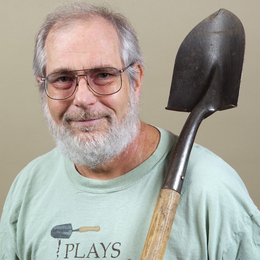
Public Radio listeners throughout the Delaware Valley instantly recognize his distinctive voice—in fact, he has said if he would just keep his mouth shut, no one would recognize him—but, that is just not how Mike McGrath, host of WHYY’s “You Bet Your Garden,” goes through life. Each Saturday morning he can be heard doling out organic advice to gardeners across the country with his unique mix of rapid-fire puns, expert advice and professional craziness.
McGrath was a regular monthly guest of the “Today” show on NBC, former editor in chief of Organic Gardening, columnist and contributing editor for GreenPrints magazine, author of several gardening books—including his latest, “You Bet Your Garden Guide to Growing Great Tomatoes”—and garden editor of WTOP News Radio in Washington, D.C. He is now heard on more than 50 radio stations nationwide. But if you think McGrath has led the quiet life of a garden writer and professional tomato tender—well, you have him all wrong.
Fans of the Philadelphia entertainment scene might recognize his name from movie and record reviews at The Drummer—an underground paper in the early ’70s—Philadelphia Daily News and Philadelphia Inquirer. He has worked for Marvel Comics, hung out with Bowie and Springsteen, and witnessed the members of Pink Floyd perform “Monty Python” skits in a rare after-show interview. Like Forrest Gump, McGrath has stumbled into the making of pop-culture history on more than one occasion, and he will be the first to tell you it wasn’t because he planned it that way.
Suburban Life sat down with McGrath to find out about life before the garden and how he went from digging up dirt to digging in it.
SUBURBAN LIFE: What is it really like to work at WHYY?
MIKE MCGRATH: It’s not like people think. … Unlike yours truly, most of the people who work at WHYY are smart, very well-prepared and incredibly earnest. In fact, there’s a few I can think of who could use an “earnest-ectomy” to remove about 20 percent of their earnestness. But it’s work: Make sure the phone lines sound good, adjust the levels and be prepared.
SL: How do you prepare for your show?
MM: One time [when the show was still recorded live] I was followed into the station by a walking stack of books—it was the very petite Terry Gross bringing a huge load of books from her house to the station. I offered to help her bring in the next batch from her car and she turned ghostly pale and said, “You’re going on the air in 20 minutes! You have to prepare!” I didn’t have the heart to tell her that my preparation was going to consist of 15 minutes reading the Inquirer’s sports section in the men’s room. She reads the books, sees the movies. … Terry is the real deal; I’m a big phony.
SL: You went to broadcast school, right?
MM: I went to Temple’s School of Communications and took radio, TV and film so that I could be professionally phony—and in a variety of different formats. But after I left Temple I didn’t go into radio, TV or film—I worked at Marvel, was a rock ‘n’ roll reporter. … It wasn’t until 20 years after college that I finally got a chance to use my education.
SL: Then how did your education land you a job at Marvel Comics?
MM: Stan Lee came to Temple when I was a freshman. … I went in before and set a recorder on the podium, then took a seat in the front row. After the talk [Lee] was mobbed for autographs and I thought, Now is my chance to retrieve the tape recorder. When I felt his hand on my wrist I thought uh-oh, but he said, “Hey kid, can you make me a copy of that tape?” He insisted he would pay for shipping so he sent a letter asking how much, and I wrote back saying, “Your money is no good; send me comics instead,” and we wrote back and forth for a year with me pestering him to hire me, which he eventually did. I took a leave of absence from school, but left Marvel pretty quickly when I realized it was work, which I was not ready for.
SL: So what made you become a gardener?
MM: I first met my wife at a party. There was this beautiful girl—22 years old, long, dark hair. … All she talked about was her grandparents’ farm and picking raspberries. … She said, “All I want is someone who can grow raspberries.” I was severely smitten and said, “I can do that.” So when I got home I called the only person I knew who gardened and he said, “You are in luck; raspberries practically grow themselves.” So I learned how to grow things for her, and found out I was actually good at it.
SL: Do you have another career in mind after this?
MM: I didn’t choose any of these things. … I can’t believe the phone kept ringing. I’ve led a charmed life. There is no lesson to be learned—just be there when the phone rings. But no; I’m not going to have a 19th career. It may have taken 40 years of fun, failure and adventure, but I think I’ve found my place on the planet.


